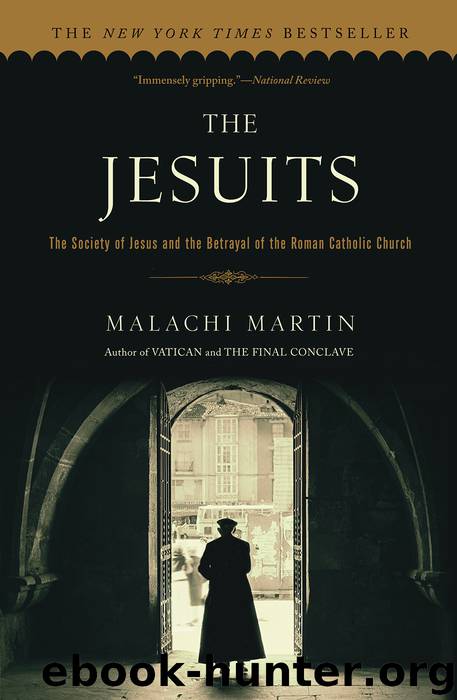Jesuits by Malachi Martin

Author:Malachi Martin
Language: eng
Format: epub
Publisher: Simon & Schuster
Published: 2013-05-27T16:00:00+00:00
13| GEORGE TYRRELL, S.J.
George Tyrrell was born in Ireland of English parents in 1861. After converting from the Anglican Church to Roman Catholicism in 1879, he entered the Society of Jesus in England one year later. Once his Jesuit formation was finished, he taught philosophy to young Jesuits-in-training at the Jesuit Stonyhurst College for two years, from 1894 to 1896. There never was any doubt about his religious zeal, and no fault was found with his practice of normal Jesuit asceticism. He was, moreover, a man who formed deep and lasting friendships, and aroused a personal devotion to himself in those he counseled and helped spiritually.
Early in his teaching career, however, doubts arose about his judgment in intellectual matters; and in spite of his conversion, which was sincere, and his Jesuit training, which was thirteen years long, he sometimes gave the impression that he had never really grasped the underpinnings of Catholic belief. Whatever it was that was not quite well-adjusted, both he and his Superiors decided he would do better in a more actively apostolic setting. So he moved to London and lived at the Farm Street Jesuit residence as one of the Jesuit priests attached to the adjoining church.
By the time he moved to London, he had already become enamored of the outlook professed by the European Modernists of his day. He was disenchanted with the official policies of his Jesuit Superiors concerning Modernism, with the quiescence of his fellow Jesuits as a group, and with the policies of the papacy and the Roman hierarchy of his time. In the glory of Victorian England and the Pax Britannica, what Tyrrell took to be the siege mentality of Rome seemed so unworthy of man, so uselessly backward. The First Vatican Council, which ended in 1870, had declared that the infallibility of the Pope was a revealed dogma to be believed on faith by all Catholics. This was totally unacceptable to Modernists. Even before that, Pope Pius X had issued two lacerating documents against Modernism, reiterating all the old—and for Tyrrell, cliché-ridden—doctrines and “medievalisms” of the old Church. All of this added up to defensive authoritarianism in Tyrrell’s mind.
During his own student days, Tyrrell had been very impressed with the results of the “higher criticism” leveled at the Bible, and with the promise of science to open up the universe. “The Modernist,” he wrote later, “demands absolute freedom for science in the widest sense of that term.” He refused to allow “theology to be tied down to any stereotyped statements, but only to the religious experiences of which certain statements are the spontaneous self-chosen expressions.” The fixed dogmas of Rome were his target.
For some time, his real thought and outlook escaped any acrid notice or condemnation. He does seem to have had an agenda all his own, its principle being that in a series of publications he would unobtrusively introduce the substance of his ideas for reforming Catholicism and bringing it up to date—for “modernizing it.” Thus, the irony and weaving style of his first five books covered over his full meaning.
Download
This site does not store any files on its server. We only index and link to content provided by other sites. Please contact the content providers to delete copyright contents if any and email us, we'll remove relevant links or contents immediately.
The Gnostic Gospels by Pagels Elaine(2531)
Jesus by Paul Johnson(2362)
Devil, The by Almond Philip C(2331)
The Nativity by Geza Vermes(2230)
The Psychedelic Gospels: The Secret History of Hallucinogens in Christianity by Jerry B. Brown(2157)
Forensics by Val McDermid(2092)
Going Clear: Scientology, Hollywood, and the Prison of Belief by Lawrence Wright(1985)
Going Clear by Lawrence Wright(1967)
Barking to the Choir by Gregory Boyle(1821)
Old Testament History by John H. Sailhamer(1814)
Augustine: Conversions to Confessions by Robin Lane Fox(1772)
The Early Centuries - Byzantium 01 by John Julius Norwich(1744)
A History of the Franks by Gregory of Tours(1728)
A Prophet with Honor by William C. Martin(1725)
Dark Mysteries of the Vatican by H. Paul Jeffers(1723)
The Bible Doesn't Say That by Dr. Joel M. Hoffman(1680)
by Christianity & Islam(1632)
The First Crusade by Thomas Asbridge(1610)
The Amish by Steven M. Nolt(1573)
